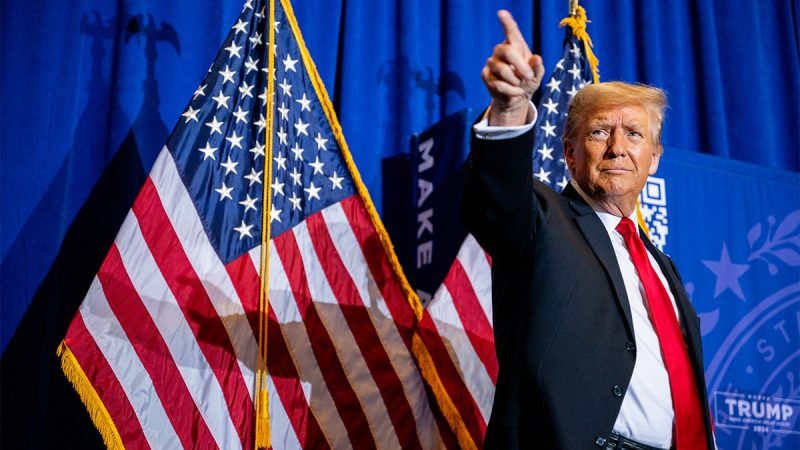
Trump says he’s a ‘believer’ in the Supreme Court after oral arguments in Colorado ballot case
Former President Trump said he is a ‘believer’ in the United States and a ‘believer’ in the Supreme Court after it heard arguments in Colorado’s effort to remove him from the 2024 ballot in the state.
Trump told reporters Thursday that it would be ‘tough’ to rule against him based on his poll numbers, but maintained that he is ‘leaving it up to’ the high court.
The U.S. Supreme Court appeared skeptical of Colorado’s argument that Trump should be removed from the state ballot for ‘insurrection’ related to the 2020 election and the Jan. 6, 2021 Capitol riots.
The court is considering for the first time the meaning and reach of Section 3 of the Constitution’s 14th Amendment, which bars former officeholders who ‘engaged in insurrection’ from holding public office again.
Trump has never been charged with inciting insurrection.
‘I just finished watching the Supreme Court… It’s unfortunate that we have to go through a thing like that,’ Trump said during a news conference at Mar-a-Lago after oral arguments concluded. ‘I consider it to be more election interference by the Democrats – that’s what they’re doing.’
Trump added that ‘the good news is, we’re leading virtually in every poll.’
The former president and 2024 Republican frontrunner said he felt the Supreme Court’s proceeding Thursday was ‘a very beautiful process.’
‘I hope that democracy in this country will continue, because right now we have a very, very tough situation,’ Trump said. ‘And with all of the radical left ideas with the weaponization of politics, they weaponized it like it’s never been weaponized before.’
Trump said that ‘every single’ case against him is ‘a phony hoax.’
‘It’s a disgrace that this country, that they work together with the Justice Department and the White House and not supposed to do that,’ Trump said. ‘Every one of these cases you see comes out of the White House. It comes out of Biden. It’s election interference, and it’s really very sad.’
Trump said he feels his defense at the Supreme Court was ‘a very good one.’
‘I think it was well received. I hope it was well received,’ he said. ‘You have millions of people that are out there wanting to vote, and they happen to want to vote for me. The Republican Party, whatever you want or however you want to phrase it, but I’m the one running, and we are leading in every poll. We’re leading in the local polls, in the state polls, and we’re leading in the swing state polls, and we’re leading very big in the national polls.’
Trump called his poll numbers ‘a very great honor.’
‘We love the country,’ Trump said. ‘I’m a believer in our country and I’m a believer in the Supreme Court. I listened today and I thought our arguments were very, very strong.’
Trump said his argument is ‘very important.’
‘The fact that you’re leading in every race, you’re leading in every state, you’re leading in the country against both Republican and Democrat and Biden. You’re leading in the country by a lot,’ Trump said. ‘And can you take the person that’s leading everywhere and say, ‘Hey, we’re not going to let you run’? You know, I think that’s pretty tough to do.’
He added: ‘But I’m leaving it up to the Supreme Court.’
During arguments, Supreme Court Justice Ketanji Brown Jackson, who was appointed by President Biden, said she understood Colorado’s argument, but pointed out that in Section 3 of the 14th Amendment, there is a list of people that can be barred – but the president is not one of them.
‘Why didn’t they put the word president in the very enumerated list in Section 3?’ Brown asked Colorado voters’ lawyer Jason Murray. ‘The thing that really is troubling to me is I totally understand your argument, but they were listing people that were barred and president is not there. And so I guess that just makes me worry that maybe they weren’t focusing on the president.’
The 14th Amendment, Section 3 of the Constitution states, ‘No person shall… hold any office… under the United States… who, having previously taken an oath, as a member of Congress, or as an officer of the United States… to support the Constitution of the United States, shall have engaged in insurrection or rebellion against the same, or given aid or comfort to the enemies thereof.’
Justice Brett Kavanaugh spoke for colleagues when saying they were confronting ‘difficult questions.’
Many of the queries focused on whether state courts or elected state officials can unilaterally enforce constitutional provisions and declare candidates ineligible for public office – so-called ‘self-executing’ authority – or whether that is exclusively the jurisdiction of the U.S. Congress. Chief Justice John Roberts warned of a ‘pretty severe consequence’ if disqualification proceedings came from ‘the other side,’ targeting Democratic candidates.
‘I would expect that a goodly number of states will say, whoever the Democrat is, you’re off the ballot,’ Roberts said. ‘It would then come down to a small number of states deciding the election.’
Justice Elena Kagan questioned ‘why a single state gets to decide who gets to be president of the United States?’ calling that ‘quite extraordinary.’
But Kagan also questioned whether it was ‘contrary’ to say the rule applies to other public office seekers, but does not apply to Trump.
Fox News’ Bill Mears, Shannon Bream, Chris Pandolfo, Gabriele Regalbuto, Anders Hagstrom, and Lawrence Richard contributed to this report.
